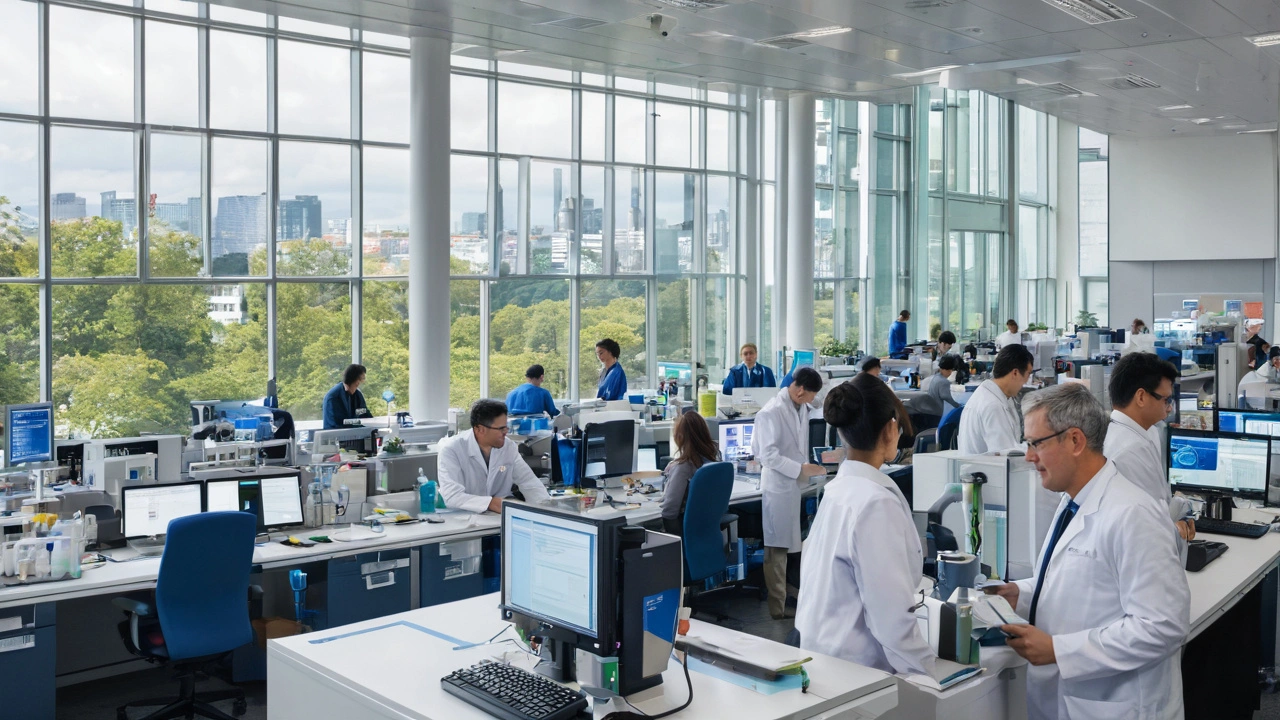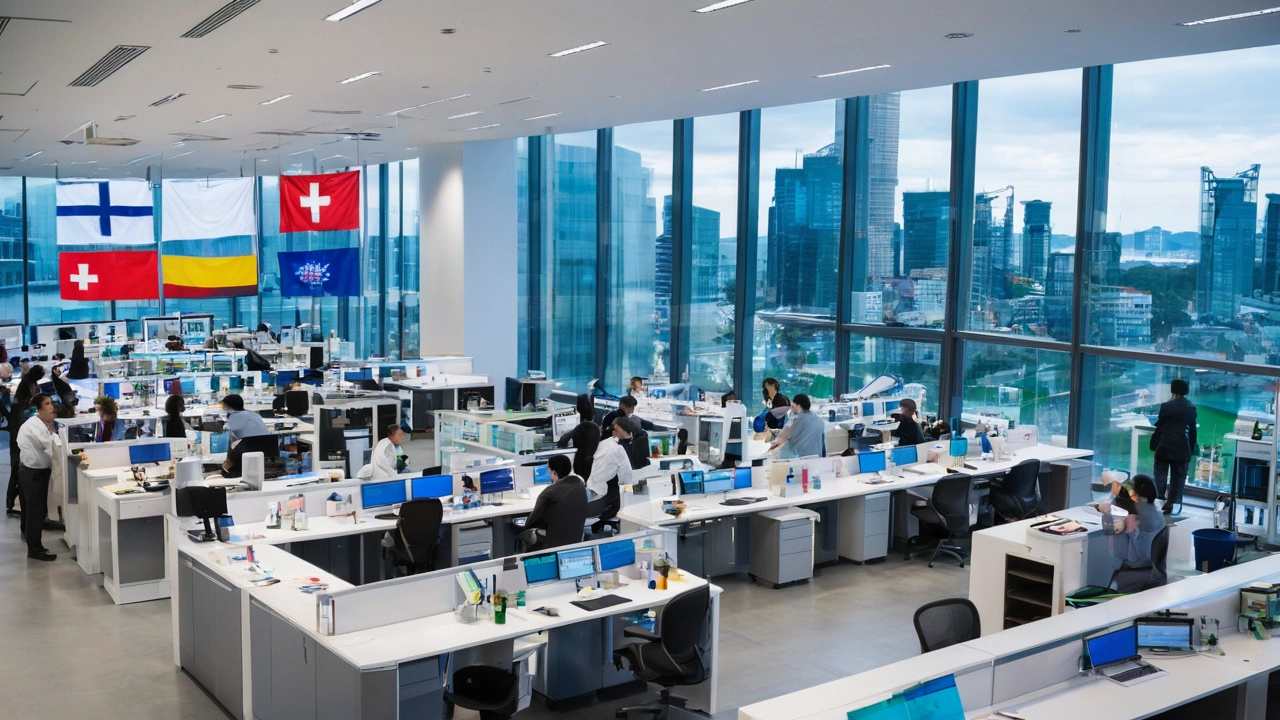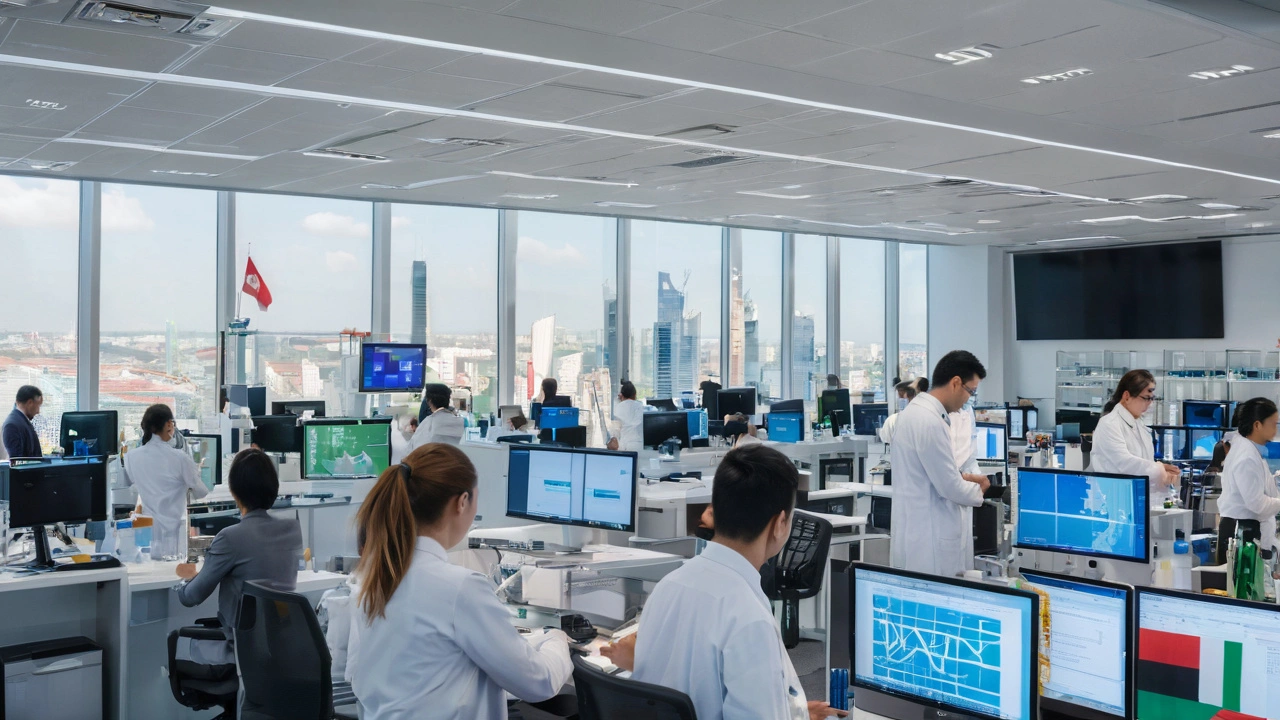Navigating the global landscape for pharmaceutical jobs can be daunting. With advancements in medicine booming and a wave of biotech startups shaking up the industry, key regions have emerged as hotspots for pharmaceutical careers.
Several factors come into play when considering where to work: industry growth, demand for professionals, salary expectations, and arguably the most crucial, quality of life. Here, we’ll dive into the countries making waves in the pharmaceutical sector and what they have to offer to professionals looking for rewarding careers.
Job Availability and Demand
When it comes to finding a job in the pharmaceutical industry, the availability of positions is often a critical factor to consider. Over the past few years, specific countries have emerged as leaders in providing abundant job opportunities. This is due to a combination of factors, including substantial investments in healthcare, government incentives, and a thriving ecosystem of research institutions and biotech firms. For instance, the United States continues to be a powerhouse in the pharmaceutical sector. With giants like Pfizer, Johnson & Johnson, and Merck headquartered stateside, there’s no shortage of roles ranging from research and development to sales and marketing. The country's commitment to innovation and significant funding for pharmaceutical R&D positions it as a top contender for job seekers.
Europe also stands out, particularly countries like Germany and Switzerland. Germany's pharmaceutical market is one of the largest in Europe, boasting various multinational companies and homegrown firms.
Pharma industry analyst Mark Harrington once noted, "Germany’s strong industrial base and significant public and private investment in pharmaceuticals make it a favorable destination for job seekers."On the other hand, Switzerland, known for its quality of life, hosts several global pharmaceutical headquarters, such as Novartis and Roche, which continually attract talent from all over the world.
The job market in Asia is equally promising, with countries like China and India at the forefront. China is rapidly becoming a significant player in the biotech and pharmaceutical sectors due to its large market size, increasing investment in R&D, and upgraded regulatory frameworks. Similarly, India, renowned for its expertise in generic drug manufacturing, offers numerous opportunities, particularly in production and quality assurance roles. Given their large talent pools and competitive salaries, these countries are on the radar for many aspiring pharmaceutical professionals.
When evaluating demand, it's important to consider not only the number of job openings but also areas experiencing the greatest needs. Specialties like biologics, personalized medicine, and digital health have seen a surge in demand. Job seekers who can bring expertise in these cutting-edge areas are especially attractive to potential employers. This demand doesn't just translate into more jobs but often into better remuneration and growth opportunities.
Technology and automation are also reshaping the pharmaceutical landscape. There’s a growing demand for professionals with skills in data analysis, bioinformatics, and AI-driven research. Countries with a robust tech infrastructure like the United States, Germany, and the UK are seeing a higher influx of these tech-pharma hybrid roles.
In summary, the job availability and demand in the pharmaceutical industry are influenced by various factors, making some countries more attractive than others. Opportunities in the United States, Germany, Switzerland, China, and India are abundant due to their strong industrial bases, investment in innovation, and specialized niches within the industry. Staying updated with emerging trends and sectors can significantly improve job prospects for pharmaceutical professionals.

Salary Expectations
When considering a job in the pharmaceutical industry, salary expectations are often top of mind. With different countries offering a varied range of salaries, understanding these differences can guide you towards making an informed decision.
The United States is renowned for its high salaries in the pharmaceutical sector. The average annual salary for a pharmaceutical scientist is around $94,000. Specialized roles, such as pharmacologists and biotechnologists, command even higher incomes, sometimes exceeding $130,000 annually. Federal statistics from the Bureau of Labor Statistics support these figures, highlighting the lucrative nature of these jobs.
Germany is another prime destination for pharmaceutical professionals. Known for its robust pharmaceutical and biomedical industries, salaries here are competitive. A pharmaceutical scientist's average earnings are approximately €75,000 per year. If you find yourself in a leading role, like a project manager, salaries can soar up to €100,000 annually. Here, being proficient in German can be quite beneficial, as it may open doors for even higher salaries and better job prospects.
Switzerland has long been a hub for pharmaceutical giants like Novartis and Roche. Salaries in Switzerland's pharmaceutical sector are some of the highest in the world. For instance, a typical salary for a pharmaceutical scientist is around CHF 110,000 annually. Moreover, the comprehensive benefits and high quality of life make Switzerland an attractive option for those seeking both professional and personal fulfillment. Remember, though, that living costs here are among the highest globally.
What about Asian countries? Japan stands out with its progressive pharmaceutical industry. In Japan, pharmaceutical scientists can expect to make around ¥8 million per year. While this might seem lower compared to Western countries, the cost of living and benefits such as subsidized housing can make up for it. English speakers might find certain challenges, but opportunities in global companies or research positions are plentiful.
India offers a distinct contrast with its emerging pharmaceutical sector. While the average pay might be lower, around ₹7,00,000 annually for a pharmaceutical scientist, the growth potential can be immense. India has been a significant player in generic drug manufacturing, and there are numerous opportunities for those looking to make an impact in the industry. It's worth noting that leading positions in multinational companies based in India offer very competitive salaries, often aligning with global standards.
"Despite varying pay scales across regions, the pharmaceutical industry offers rewarding and promising careers worldwide," says Dr. Emily Foster, a senior researcher at the Global Health Organization.

Quality of Life
Choosing where to work in the pharmaceutical industry isn’t just about job availability and salaries. It’s also about finding a place where you can live a fulfilling, balanced life. Quality of life acts as a crucial pillar when considering relocation for a job. This includes factors like healthcare, education, cultural richness, and even the climate. Let’s explore some top countries where life beyond work is just as rewarding.
For example, Switzerland is known not only for its high-paying pharmaceutical roles but also for its outstanding quality of life. The country boasts world-class healthcare and education systems. The scenic beauty, from the Alps to serene lakes, provides endless opportunities for outdoor activities. Zürich and Basel, two of the country's pharmaceutical hubs, consistently rank high in global liveability indexes. These cities offer a combination of modern amenities and charming history.
Moving to another part of the globe, Canada also shines for both its pharma jobs and its high quality of life. Canadian cities like Toronto and Vancouver serve as significant centers for the pharmaceutical industry. They are also known for their multicultural environments and welcoming communities. Canada offers excellent public services, and with vast natural landscapes at your doorstep, work-life balance becomes easily attainable.
In Asia, Singapore stands out. It’s a hub for biotech and pharma, with many multinational companies having their headquarters there. Singapore is renowned for its meticulous urban planning, ultra-modern infrastructure, and high standards of cleanliness and safety. Public transportation here is efficient, making daily commuting hassle-free. The country’s food scene, blending various Asian cuisines, is yet another delightful perk.
The United States is home to numerous cities that offer both great pharma careers and a high quality of life. Cities like Boston and San Francisco are pivotal to the industry. Boston, with its rich history and world-renowned universities, provides an intellectual and cultural atmosphere that’s hard to beat. San Francisco offers a mix of innovative spirit and natural beauty, set against the backdrop of Silicon Valley's technological advancements.
Europe’s Germany also offers a blend of professional opportunities and excellent living standards. Cities like Berlin and Munich are notable for their innovation in pharmaceuticals. Living in Germany means benefiting from comprehensive healthcare and a strong social security system. The country's rich history, combined with modern art and music scenes, adds vibrant layers to daily life.
It's clear that choosing a place to relocate involves a balance between professional and personal satisfaction. As you contemplate this significant decision, consider not just the job itself but the life you and your family will lead outside of work. A fulfilling career is gratifying; however, residing in a country offering a magnificent quality of life makes the experience immeasurably better.

 Exploring the Warmth of Ethiopia: Are Ethiopians Truly Friendly?
Exploring the Warmth of Ethiopia: Are Ethiopians Truly Friendly?
 Understanding Wage Rates in Ethiopia: What You Need to Know
Understanding Wage Rates in Ethiopia: What You Need to Know
 What is the Average Salary of a Nurse in Ethiopia? Exploring Nursing Wages and Benefits
What is the Average Salary of a Nurse in Ethiopia? Exploring Nursing Wages and Benefits
 Understanding the Average House Rent in Ethiopia: A Helpful Guide
Understanding the Average House Rent in Ethiopia: A Helpful Guide
 How Many Millionaires Live in Ethiopia? Discover the Financial Elite
How Many Millionaires Live in Ethiopia? Discover the Financial Elite
Milo Cado
August 10, 2024 AT 18:09Exploring pharma hotspots in 2024 is truly exciting 😊.
The United States remains a powerhouse thanks to its massive R&D budgets and numerous biotech hubs.
Germany's blend of engineering prowess and strong public funding creates fertile ground for innovation.
Switzerland, with its unrivaled quality of life, continues to attract top talent to companies like Novartis and Roche.
China’s rapid regulatory reforms are opening doors for both domestic and foreign researchers.
India’s growing generic sector offers abundant manufacturing positions and a vibrant startup scene.
Canada’s multicultural cities provide both career growth and a welcoming environment for newcomers.
Singapore’s strategic location and immaculate infrastructure make it a gateway to Asia‑Pacific markets.
The emphasis on personalized medicine means that specialists in genomics are in high demand worldwide.
Data scientists with bioinformatics skills find themselves courted by firms across the US, Germany, and the UK.
Salary competitiveness often mirrors cost‑of‑living considerations, so the high wages in Switzerland are balanced by expensive housing.
In the US, the average pharma scientist enjoys around $94,000 a year, which, while attractive, varies by region and specialty.
Europe’s €75,000 average in Germany reflects strong labor protections and a solid social safety net.
Asian markets may offer lower nominal pay, but benefits such as subsidized housing in Japan can offset the difference.
Quality‑of‑life rankings consistently place Switzerland and Canada near the top, highlighting healthcare, education, and outdoor recreation.
Ultimately, weighing job opportunities, compensation, and lifestyle will guide you to the best fit for your career path 🌍.
MONA RAMIDI
August 20, 2024 AT 08:33This article’s glossy praise for pharma megacities feels like a shallow brag fest that ignores the soul‑crushing grind of real lab work 😡.
grace riehman
August 29, 2024 AT 22:57I think the list does a good job of highlightin key markets, but it could use more detail on the work‑life balance in each spot.
For instance, Canada’s healthcare system is top‑notch and that’s a big draw for many.
Also, don’t forget the cultural vibe in Germany – the festivals are amazing!
Overall, it’s a solid start for anyone thinking about moving abroad.
Vinay Upadhyay
September 8, 2024 AT 13:21Oh great, another “top pharma countries” list that pretends geography is the only hurdle.
Sure, the US pays more, but have you considered the insane commute times in Boston?
Germany’s engineering might be impressive, yet the bureaucracy can feel like a labyrinth.
And let’s not forget Switzerland’s cost of living that will eat your salary whole.
Meanwhile, Asian markets promise growth, but the regulatory chaos can be a nightmare.
Bottom line: pick a place, survive, and hope the next grant isn’t cut.
Eve Alice Malik
September 18, 2024 AT 03:45I’ve been scanning the data on biotech hubs, and it’s clear that networking events in Boston really boost career momentum.
Joining local meet‑ups can open doors to collaborations that aren’t advertised online.
If you’re eye‑ing a move, start connecting on LinkedIn with researchers in those regions now.
Also, keep an eye on visa policies, especially for non‑EU citizens targeting Germany.
The industry’s fast pace rewards those who stay proactive.
Debbie Billingsley
September 27, 2024 AT 18:09The United States remains unrivaled in pharmaceutical innovation and should be the primary destination for ambitious scientists.
Its robust funding mechanisms and market size guarantee superior career prospects compared to any foreign market.
Patrick Van den Berghe
October 7, 2024 AT 08:33Switzerland shines for pharma jobs its salary and lifestyle unbeatable
Josephine Gardiner
October 16, 2024 AT 22:57The foregoing analysis delineates a comprehensive overview of global pharmaceutical employment landscapes.
It cogently correlates economic indicators with professional opportunities across distinct jurisdictions.
Moreover, it underscores the pertinence of quality‑of‑life metrics in occupational decision‑making.
The synthesis presented herein affords prospective candidates a judicious framework for strategic relocation.
Consequently, stakeholders may derive substantive benefit from the articulated insights.
Jordan Fields
October 26, 2024 AT 13:21The salary differentials align closely with regional cost‑of‑living indices.
Accordingly, compensation packages reflect local economic conditions.
Divyaa Patel
November 5, 2024 AT 02:45One could argue that chasing the highest salary is a mirage in a world where wellbeing is the true currency of success.
The glitter of Swiss francs pales when juxtaposed with the serene mountain air that nourishes the soul.
Yet, the relentless hustle in bustling Asian megacities offers a different kind of exhilaration, a fire that fuels ambition.
In the end, the choice of locale becomes a reflection of one’s inner compass, a dance between material reward and existential fulfillment.
Let us not forget that the most celebrated breakthroughs often emerge from humble labs where passion outweighs profit.
So, dear reader, temper your aspirations with humility and curiosity.
May your journey through the pharma cosmos be both prosperous and profound.